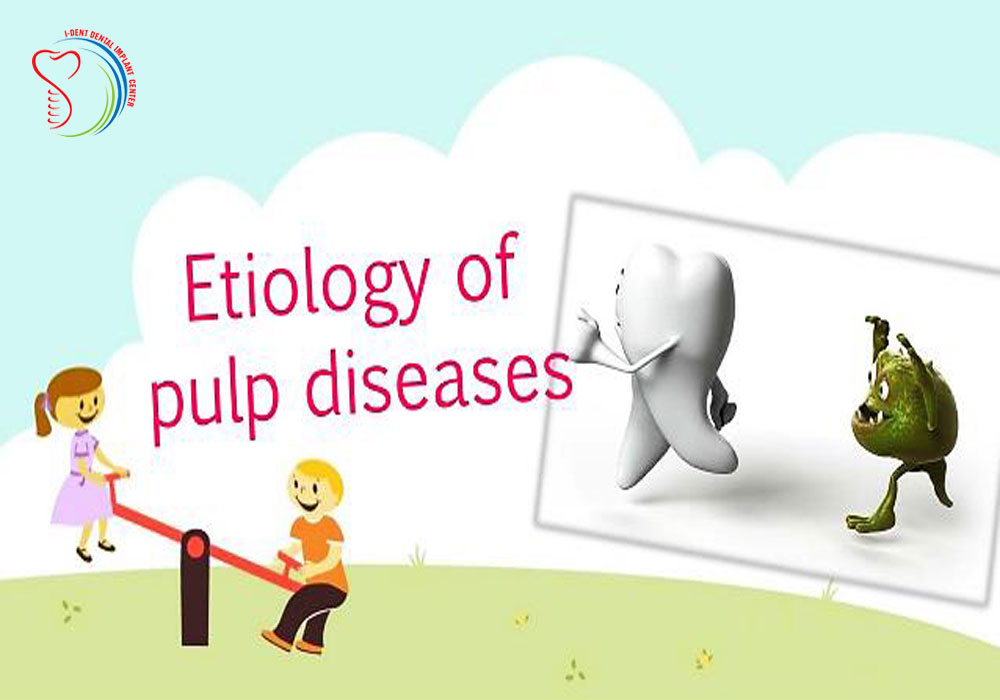Hotline
(+84) 94 18 18 616

Inflammation of the dental pulp may be produced when it is invaded by organisms through a deep carious lesion. When a deep carious area is restored by a metallic restoration without an insulating substance being placed in the base of the cavity, the pulp is subjective to frequent and wide ranges of temperature change because the metal of the restoration is an excellent conductor of heat and cold. Severe changes in temperature may be transmitted to the pulp from eating something ice cold followed almost immediately by something very hot. The pulp may be subject to a sudden temperature change because of the heat generated in the preparation of a cavity or the polishing of a filling. The rapid and forceful preparation of cavities without coolants and the forceful and rapid polishing of restorations and teeth will generate sufficient heat to produce pain. If the heat Is prolonged or intense, permanent injury to the pulp will result.
Inflammation of the pulp occurs when it is injured. This inflammatory reaction to injury, designated as pulpitis, is usually attended by pain and described by the patient as a toothache. Pain is a fairly constant symptom of pulpitis but the presence of pain in the region of the teeth is not always indicative of pulpal disease. The characters, intensity and duration of a toothache are diagnostic symptoms which are dependent upon the type of pulpitis present.

CAUSES
Bacteria penetrate from the crown or root of the tooth through a variety of ways such as cavities, fractures due to trauma, abnormalities of teeth such as infection from the tip of the periodontal pocket or periodontal abscess. Tooth decay is a form of injury that usually causes myelitis.
Expressions of tooth enamel disease:
There are many manifestations of tooth decay in each stage because each stage is different:
Chronic chronic infection: Symptoms of dizziness, and pain persist for hours. Each pain comes at an early stage, especially at night. Dental surgery increases the pain.
Tooth pulp: manifested as intense pain attacks, tears, pain in the nose, increased pain in the cold as food and water into the deep. Many cases of pus lead to painful shock like pulse, such as drumming in the ears, toothache feeling loose ...
Necrotic kidney: This is the wall of teeth that are not treated for myelitis and have resulted in necrosis. There will be no more pain in the patient. However, untreated dead teeth will lead to inflammatory diseases around the tooth root, abscess around the tip of the tooth ...
Restorative pulp: Expression is mild pain, transient appearance is similar to the feeling of sensitivity in the teeth when the cold. The symptoms at this stage will not last long, if not known for the treatment will quickly turn to expression of another stage.
PREVENTION AND TREATMENT OF TOOTH DECAY
To prevent tooth decay, you should pay attention to dental hygiene carefully to avoid tooth decay. Candles for dental examination every 6 months to detect dental diseases can lead to tooth inflammation such as: tooth decay, gingivitis, periodontitis ...
When you have dental pulp disease, you should see a dentist as soon as possible. You will be examined and prescribed by your doctor as prescribed. The treatment of tooth inflammation can include many treatments at the specialty depending on the status of the disease such as removal of pulp, sealed canal ...
Note: the efficacy of the treatment can vary depending on each patient’s condition.
For more information please contact:
I-DENT DENTAL IMPLANT CENTER
Dental Clinic - Ho Chi Minh City An Dong
Building 193A-195 Hung Vuong Str, Ward 9, District 5, HCMC
Dental Clinic - Ho Chi Minh City The Army Navy Swimming Pool
Building 19V Nguyen Huu Canh Str, Ward 19, Binh Thanh District, HCMC
Phone: (+84) 28 38 33 68 18
Website: http://www.identdentalimplantcenter.com
Email: identdentalimplantcenter@gmail.com
RELATED: What is the cost of full mounth dental implants in Vietnam, Denal crown done by internation dentist in Vietnam, Dental tourim in Vietnam